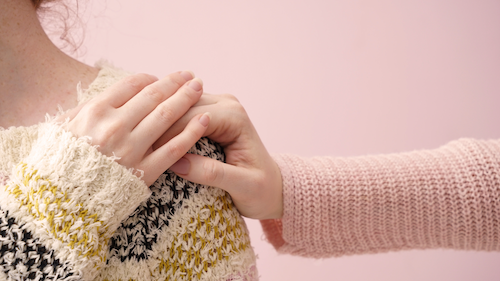
When someone is grieving it can be hard to know how best to help. We might tell them that we are there for them and ask if there’s anything we can do but often the person can’t articulate what they need.
A common practice is to bring food – we can show people that we care by taking the time to cook them something nutritious. This is a lovely gesture and is often warmly welcomed by people who might be struggling to think about feeding themselves and their families. A casserole can give them important nutrition at a time when they may be neglecting their wellbeing. A cake can be useful to offer people who drop in to offer condolences. We also know that nutrition and hydration are important to support wellbeing after the physical and mental stress of bereavement.
Food is a practical way to help and there are plenty of other ways to give useful support after bereavement. Here are a few ideas and things that people have told us they have found helpful.

Tea and coffee
One alternative to bringing a cake or casserole is to make up a basket of teabags and ground or instant coffee, perhaps with a packet of nice biscuits too, that can be used for visitors.
Gardening
Depending on the time of year, an offer to cut the lawn or tidy the garden might be very welcome. Rather than asking whether the person would like their lawn cutting, it might be more helpful to let them know that you cut your lawn on a certain day of the week and will pop across and do theirs for the next few weeks, while you have your mower out. This can make it easier for them to accept the gesture.

Childcare
If there are young children in the family, an offer to take them to the park for a morning or help with school and activity runs is likely to be appreciated. Although they may want to involve their children in discussions about death and visits from well-wishers, the offer of a distraction for younger members of the family and help in maintaining their routine will be appreciated.
Walking the dog
Routine activities like walking the dog can feel like a huge effort following bereavement. An offer to call in once or twice a day to take the dog out is a down-to-earth way to show support. Once again, giving definite times and sticking to them will be extra helpful.

Stay in touch
If you don’t live close enough to offer practical day to day support, keep in touch with a regular phone call or visit. Remember to continue contact after the funeral and keep in mind that there is no timescale for grief. Your support and presence may be needed for some time to come.
A regular message asking – “How are you today?” lets them know that you are thinking of them and avoids asking that one big tricky question “How are you?”.
Arrange activities and outings
Everyone grieves in different ways and some people can take time before they are ready to resume things they used to enjoy doing. They may find it hard to be in group situations because they are worried about becoming emotional. Think about arranging safe activities that can be cancelled at short notice, such as a walk in the park or a trip to the beach.
Again, this is something that can continue for many months after the funeral and may even become a regular routine. When someone is grieving, it can be helpful simply to know that someone is calling in every other Friday for a walk or a cup of coffee, even if they don’t feel up to it on the day.
Don’t worry if your offers are rejected
Grief brings up all sorts of emotions and it can affect the way a person behaves from one day to the next. Try not to take it personally if your offers of help are turned down or if you unintentionally say something that is taken the wrong way. By continuing to be present, available and not taking offence, you will be providing support anyway.
Bereavement is a time of loss and change which is why the constant presence and support of friends and family members is so important. Gratitude may not always be apparent but in the long term, as the person adjusts to their new way of living, your dependability will make a difference.
If you are supporting someone who is bereaved there are some useful resources on our website that may help them. You can find details of creative activities and ways of remembering someone who has died on our page about continuing bonds. We also run a bereavement support group which is open to all.



